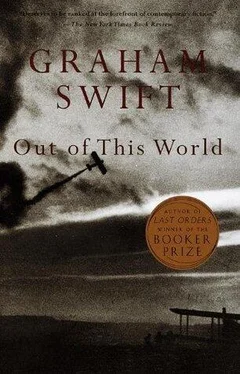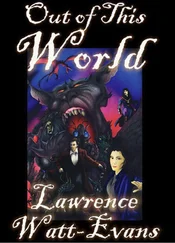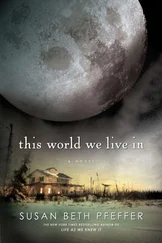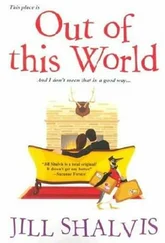Graham Swift - Out of This World
Здесь есть возможность читать онлайн «Graham Swift - Out of This World» весь текст электронной книги совершенно бесплатно (целиком полную версию без сокращений). В некоторых случаях можно слушать аудио, скачать через торрент в формате fb2 и присутствует краткое содержание. Год выпуска: 2012, Издательство: Vintage, Жанр: Современная проза, на английском языке. Описание произведения, (предисловие) а так же отзывы посетителей доступны на портале библиотеки ЛибКат.
- Название:Out of This World
- Автор:
- Издательство:Vintage
- Жанр:
- Год:2012
- ISBN:нет данных
- Рейтинг книги:3 / 5. Голосов: 1
-
Избранное:Добавить в избранное
- Отзывы:
-
Ваша оценка:
- 60
- 1
- 2
- 3
- 4
- 5
Out of This World: краткое содержание, описание и аннотация
Предлагаем к чтению аннотацию, описание, краткое содержание или предисловие (зависит от того, что написал сам автор книги «Out of This World»). Если вы не нашли необходимую информацию о книге — напишите в комментариях, мы постараемся отыскать её.
Out of This World — читать онлайн бесплатно полную книгу (весь текст) целиком
Ниже представлен текст книги, разбитый по страницам. Система сохранения места последней прочитанной страницы, позволяет с удобством читать онлайн бесплатно книгу «Out of This World», без необходимости каждый раз заново искать на чём Вы остановились. Поставьте закладку, и сможете в любой момент перейти на страницу, на которой закончили чтение.
Интервал:
Закладка:
Bill and I worked together for a while on the same paper. He used to tell a story about when he was at Nordhausen, the first of the camps he witnessed. He had not known then that he would later become a professional news photographer or whether he wanted to be one. Before the corpses were removed he deliberately went to look at them, because he thought he should do so without the protection, as it were, of his camera. He found himself virtually alone beside a row of bodies — people were staying clear because of the terrible smell — but while he was standing there an American corporal approached from the other end of the row. Bill used to say that the corporal’s uniform looked particularly new and pressed and his face clean and fresh, as if he had just stepped off the troop plane, but I wondered if this was Bill’s embellishment. The G.I. was approaching the corpses with a handkerchief held over his nose and mouth, but he also had a camera round his neck — his own camera, new-looking — and he started to take pictures. He would wrench his hand from his face, raise the camera and repeat, ‘Oh my God, oh my God,’ apparently not noticing Bill. Bill said it was like some parody of the determined sightseer desperate to take snaps for the folks back home. He wondered whether without the camera the corporal could have got so near. Or whether he needed, as if to convince himself, the future proof of what his own eyes were seeing.
But the point of the story is that in his agitation the American had forgotten to take the lens-cap from his camera. Bill said he could have gone up to him and told him. He could have made that decision. But he didn’t.
Sophie
How can I tell, Doctor K? Tell me how to tell it. People say: ‘It was all over in an instant’ or ‘It happened so quickly.’ But it isn’t like that. Something happens to time. Something happens to normality. A hole gets blasted in it. A hole with no bottom to it. So what is over in an instant just goes on happening. It happens in long slow-motion. And then it just keeps on happening. So that afterwards, when I was some place else, here in New York, three thousand miles away, it wasn’t afterwards or some other place, I was still there, on the terrace at Hyfield, standing, frozen, as if I might never move again, with that strange noise in my ears, the noise of absolute silence. Couldn’t even hear Mrs Keane screaming. Apparently she was screaming, her mouth was wide open. Only the voice in my head, like the distant voice down a telephone, which was saying: Something terrible has happened. Is happening. Is happening.
Because you don’t believe it. You don’t believe that one moment — Then the next — Because you don’t believe it can have happened. So it goes on happening. Till you believe it. How can I tell you what I don’t believe? What do you want me to say? I was there. Heard. Saw. On the spot. How does that help?
And what am I trying to tell you, anyway? That on an April morning ten years ago, my grandfather was blown up by terrorists, along with his chauffeur and a Daimler. And that if I hadn’t been standing there on the terrace, about to sit down with the cup of coffee Mrs Keane had brought, and thinking, Now I will talk to Harry — if I’d said goodbye to Grandad at the front porch and not on the terrace (‘Goodbye,’ he said, ‘no, stay here, sit down,’ like a husband who thinks that even a newly pregnant woman shouldn’t move) — then I might — Too.
Goodbye. A kiss. Another sixty seconds –
And if Harry hadn’t been up in the rear bedroom, packing his things — And if Mrs Keane hadn’t just stepped from the kitchen, with a fresh tray of coffee –
But you know all that. Or you can look it up. Do you do your homework, Doctor K? ‘Lucky escape of Harry Beech and his Daughter’: that was how the newspapers put it, mentioning Mrs Keane only as an afterthought. Lucky escape! And then of course the pictures. The ‘gruesome’ pictures. Wreckage ‘littering the once immaculate lawn’. Policemen sifting. And the newsreels and telerecordings. Mr and Mrs Carmichael leaving the hospital. (Can you describe, Mrs Carmichael, can you describe, exactly?) Harry Beech arriving at Hyfield in a police car. He looks like a criminal. ‘This very morning, by grim irony, Mr Beech was about to leave for Northern Ireland.’
It’s all there. It was all news, public knowledge. What more can I say? Except how it really –
By grim irony.
You see, I wanted to talk to him alone. I wanted to sit there with him on the terrace, just like I’d sat with Grandad, and talk. About me and Joe. And America and Hyfield. About homes and families (homes and families!). He had an hour or more before he had to leave for his plane. I think I even said to him, Go and pack your things, then let’s talk. I wanted to say to him, When did we last talk together, really talk, you and I? Yes, yes, I know you are going off, again, to Northern Ireland this time, and that is far more important of course than any piffling bit of news I can give you, like the fact that I am pregnant. But I am going to be a mother. Doesn’t that remind you of being a father?
But.
He must have looked out of the rear bedroom window. Seen us on the terrace: the coffee things scattered over the paving, Mrs Keane screaming her head off without making a single sound. Then he must have gone through to the front landing.
Or maybe he didn’t even bother to check where we were.
How long did I stand, petrified on the terrace? You don’t consult a stop-watch, you don’t have a tape-measure. You don’t say: Let’s make an objective — I went into the house. The way you walk in dreams. It wasn’t a house any more. A fog of dust and smoke. Perhaps I was glad of that fog. Glass. Broken things. I didn’t believe it. A hub-cap lying in the hall. The front door flung at the foot of the stairs. I went out where the front door wasn’t.
Little scattered fires all over the lawn.
What do you want, an exact description? I saw what you see when a bomb has gone off in a car with two people in it. Enough? The police say, Have you told us everything? You say, Isn’t that enough? They say, Can you remember anything else? The police are a bit like you, Doctor K. Only less cute.
He was leaning out of the upstairs window. I don’t know why I looked up. Because I saw him move? Because looking up, looking away, was better than — He was leaning out of the upstairs window. Or rather, where the window had been.
You see, that’s when I believed. That’s when I knew it’s all one territory and everywhere, everywhere can be a target and there aren’t any safe, separate places any more. I’ve never told anyone. I’ve kept so quiet about it that sometimes I actually think it was — what would you call it? — a ‘hallucination under extreme stress’. I saw him first, then he saw me. He was like a man caught sleep-walking, not knowing how he could be doing what he was doing, as if it were all part of some deep, ingrained reflex. But just for a moment I saw this look on his face of deadly concentration. He hadn’t seen me first because he’d been looking elsewhere, and his eyes had been jammed up against a camera.
Harry
Privacy! That was the word that was always flung at me!
The photograph, not the photographer. No autobiography, please. And no glamour, definitely no glamour.
Only once, in the autumn of ’66, when Sophie was abroad (was that significant?), did I consent to present myself as the subject — or should I say object? — of media scrutiny. I still remember the studio lights, those beige studio chairs, the clip-on microphone with the wire that ran up my sleeve, and the feeling that I had only myself to blame — for surrendering to my publisher’s coercion (this was the year of Aftermaths ) and (I confess it) to the inducements of flattery. Since the lead-in, at least, to this twenty-five-minute late-night slot, was cheerily declaring: ‘Already a growing legend among news photographers …’ If it was also ominously stating its terms: ‘But what of the man behind the camera? The mind behind the lens …?’
Читать дальшеИнтервал:
Закладка:
Похожие книги на «Out of This World»
Представляем Вашему вниманию похожие книги на «Out of This World» списком для выбора. Мы отобрали схожую по названию и смыслу литературу в надежде предоставить читателям больше вариантов отыскать новые, интересные, ещё непрочитанные произведения.
Обсуждение, отзывы о книге «Out of This World» и просто собственные мнения читателей. Оставьте ваши комментарии, напишите, что Вы думаете о произведении, его смысле или главных героях. Укажите что конкретно понравилось, а что нет, и почему Вы так считаете.












